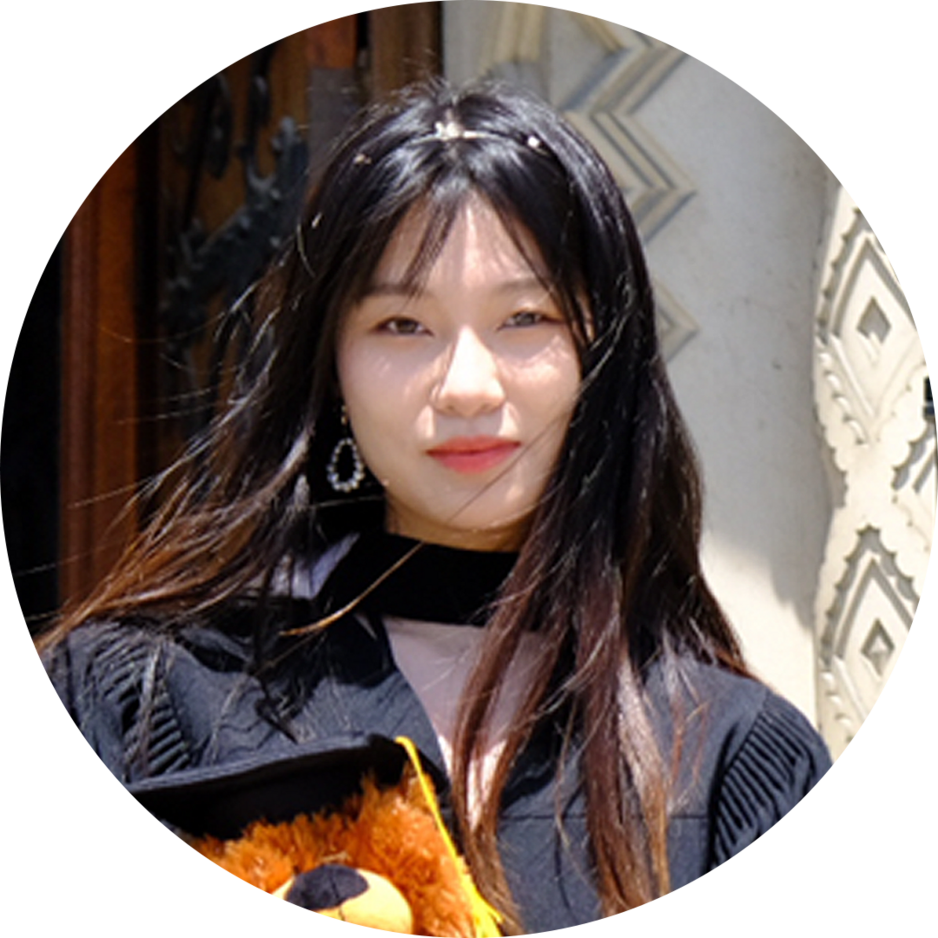Get to learn our graduate students!
'Graduates of GRIP' highlights our 2024 student presenters. Learn more about their background, current research, and life outside of the lab.
Lauren Cadel
Degree: PhD, Pharmaceutical Sciences | Lab: Guilcher | GRIP Role: CSAP Seminar Winner
- 1. Briefly, what is your academic background and what is your current area of research?
-
I completed my BSc in Biology from Bowling Green State University and my MSc in Pharmaceutical Sciences from the University of Toronto. My current area of research focuses on the co-development and evaluation of a medication self-management toolkit for adults with spinal cord injury/dysfunction.
- 2. Why did you choose this research area and why is it important?
-
This area of research is important because following a spinal cord injury, many individuals experience secondary conditions and take multiple medications.
Medication regimens can be complex and interfere with one's daily activities. Through this research, a comprehensive toolkit to support medication self-management will be developed, which has the potential to empower individual's health and well-being.
- 3. What are the main challenges of your research and how have you learned to tackle them?
-
Recruitment is a common challenge experienced. One of the best ways I have learned to tackle this challenge is building relationships with the community and community organizations.
- 4. What keeps you motivated when your experiments don’t work, or when you don’t get the expected outcome? How do you cope with this stress?
-
My biggest motivation is knowing that the toolkit that is developed from this research has the potential to positively impact the day-to-day lives of people with spinal cord injury.
- 5. How do you cope with stress?
-
I cope with stress by breaking my tasks down into checklists and working to accomplish them one at a time. Exercise and spending time with friends and family (and their dogs) are also good ways to reset.
- 6. How is your graduate program contributing to your career and personal success?
-
My graduate program is contributing personal and professional development by providing me with countless opportunities to expand my research-related knowledge, create collaborative relationships with students and faculty, develop my teaching and mentorship skills, and enhance my ability to think critically. I thank my supervisor, Sara Guilcher, for her support and contributions to both my academic and personal successes through my graduate studies.
- 7. What is your advice to the next generation of PharmSci researchers?
-
Think big and know what motivates you. Research can be challenging but it allows you to constantly ask questions, think, and solve problems. Knowing what motivates you and acknowledging the bigger picture can help you through some of the challenges you experience.
- 8. How is your life outside the lab? What kind of activities or hobbies do you have?
-
Outside of the lab, I coach rep soccer. I love being outside and being active so most of my hobbies encompass those two things - biking, running, paddle boarding, hiking, swimming.
Jiamin Liao
Degree: PhD, Pharmacology | Lab: Uetrecht | GRIP Role: BMS-C Seminar Winner
- 1. Briefly, what is your academic background and what is your current area of research?
-
I am currently pursuing my PhD in Dr. Uetrecht’s lab. I hold a Bachelor of Science degree specializing in Pharmacology & Biomedical Toxicology with a minor in Biology from the University of Toronto. My research primarily investigates the early immune responses to drugs that may trigger idiosyncratic drug reactions (IDRs) and explores potential biomarkers for predicting the risk associated with IDRs.
- 2. Why did you choose this research area and why is it important?
-
I chose this research area due to my interest in understanding idiosyncratic drug reactions (IDRs), which are unpredictable and can be severe. IDRs are a major challenge in drug development because they are usually not detected until late clinical trials and are a leading cause of drug candidate failures. By uncovering early immune responses and identifying potential biomarkers, my research aims to predict the risk of IDRs, improving drug safety and preventing significant financial losses.
- 3. What are the main challenges of your research and how have you learned to tackle them?
-
The main challenge of my research is the lack of valid animal models, as IDRs are also idiosyncratic in animals, making them difficult to study. However, it is well accepted that most IDRs are mediated by the adaptive immune response, which is preceded by the innate immune response. The innate immune response occurs in every patient and is not idiosyncratic, opening a new direction to study the mechanism of IDRs. By focusing on the innate immune response, I have been able to develop more reliable models and methods to investigate the early stages of IDRs.
- 4. What keeps you motivated when your experiments don’t work, or when you don’t get the expected outcome? How do you cope with this stress?
-
When I don’t get the expected results, I stay motivated by focusing on the bigger picture and the potential impact of my research on drug development and patient care. I believe setbacks are a natural part of the scientific process, and even negative results are valuable because they help rule out incorrect options. To cope with stress, maintaining a healthy work-life balance and a positive mindset is essential. Additionally, discussing challenges with my mentor and lab partners often provides inspiration and assistance.
- 5. How do you cope with stress?
-
I believe that feeling stressed is a normal part of learning and working. While stress can have negative psychological effects, it also motivates us to complete tasks and advance our research. I don't try to eliminate stress but instead find ways to manage it effectively. For example, if I have too many tasks, I create a to-do list and prioritize tasks based on urgency and ease of completion. This helps me relax better during breaks and prepare for the next day's tasks. Additionally, I find that tackling more difficult tasks in the morning allows me to complete them more efficiently.
- 6. What is the emerging technology in Pharmaceutical Sciences that excites you the most and why?
-
I think single-cell multi-omics is very interesting. This technology integrates data from multiple types of biomolecules, such as DNA, RNA, proteins, and metabolites, at the single-cell level. Coupled with advanced flow cytometry, single-cell multi-omics allows for a comprehensive analysis of individual cells, providing a detailed understanding of cellular heterogeneity and the complex mechanisms underlying diseases. This approach can help identify novel biomarkers. It's a new and powerful tool for pharmaceutical research.
- 7. How is your graduate program contributing to your career and personal success?
-
My graduate program is contributing to my career and personal success by offering courses and seminars that enrich my knowledge base and broaden my perspectives necessary for research. It also provides advanced technology and resources, giving me the opportunity to collaborate with various professional facilities for research, such as conducting RNA sequencing and proteomics. The challenges I encounter and overcome in my research are helping me develop critical problem-solving skills and discover the best ways to balance work and life.
- 8. What is your advice to the next generation of PharmSci researchers?
-
My advice to the next generation of PharmSci researchers is to remain curious and persistent. Treat challenges as opportunities to learn and grow, and don't be discouraged by setbacks. Stay updated with the latest advancements in your field and be open to interdisciplinary collaborations, as they sometimes can provide new perspectives and innovative solutions. Additionally, seek mentorship and actively engage with your peers, as building a strong support network can provide guidance and motivation throughout your research journey.
- 9. How is your life outside the lab? What kind of activities or hobbies do you have?
-
Outside the lab, I am passionate about travelling and exploring nature, which helps me clear my mind and relax. I also enjoy trying different cuisines with friends and family. My hobbies include fishing, snowboarding, and playing video games, which I find are great ways to relieve pressure and have fun.
Madeline Brown
Degree: PhD, Pharmaceutical Sciences | Lab: Reilly | GRIP Role: BMS-A Seminar Winner
Madeline Brown
- 1. Briefly, what is your academic background and what is your current area of research?
-
I completed my undergraduate degree at Queens University in Life Sciences. My current area of research investigates the potential of gold nanoparticles labeled with Auger Electron emitting radioisotopes for the treatment of glioblastoma multiforme.
- 2. Why did you choose this research area and why is it important?
-
I selected this area of research as glioblastoma multiforme is the most common and lethal form of brain cancer. Current therapeutic options have shown limited success in curative treatment, particularly due to residual tumour cells being left at the surgical margins. This will result in the recurrence of GBM in around 90% of patients, which is far more aggressive and resistant to medical intervention. My research aims to bridge this therapeutic gap and directly target the residual tumour cells before recurrence happens by infusing a radiation nanomedicine into the surgical cavity.
- 3. What are the main challenges of your research and how have you learned to tackle them?
-
One of the major challenges I face with my research is the time constraints involved with working with radioisotopes. Typically, these radioisotopes have very short half-lives often less than three days, which is a very short time window to produce results. In order to address this challenge, I have had to learn to manage my time more effectively, plan my experiments well in advance, and prioritize certain results.
- 4. What keeps you motivated when your experiments don’t work, or when you don’t get the expected outcome? How do you cope with this stress?
-
When my experiments don’t work out as expected I find it best to take a step back and remember the long-term goals and potential impact of my research to stay motivated. At times it can be difficult to stay positive, but I try to look at these failed experiments as learning opportunities. To cope with the stress, I tend to try discussing the problems I am experiencing with lab members, often they have encountered similar issues and can give me advice on what to try next.
- 5. How do you cope with stress?
-
To cope with stress, I spend time with my family and friends to help me unwind. Additionally, I enjoy going on walks with my dog, which offers a refreshing break and a chance to clear my mind.
- 6. What is the emerging technology in Pharmaceutical Sciences that excites you the most and why?
-
The emerging technology that excites me the most is the advancement in theranostics and artificial intelligence. Theranostic advancements are revolutionizing personalized medicine by combining diagnostics and therapy into a single platform, allowing for more precise and effective treatments. AI is enhancing drug discovery and development, making processes faster and more accurate. Together, I think that these technologies have the potential to significantly improve patient outcomes and transform the precision medicine field.
- 7. How is your graduate program contributing to your career and personal success?
-
My graduate program is contributing significantly to my career and personal success by providing opportunities for high-quality research and enabling me to publish my findings in reputable journals. Additionally, it offers extensive networking opportunities with professionals and experts in the field, helping me build valuable connections and collaborations.
- 8. What is your advice to the next generation of PharmSci researchers?
-
My advice to the next generation of PharmSci researchers would be to explore different fields and topics within pharmaceutical science until you find what truly excites you. Being passionate about your research is a critical component of successful research and can drive your curiosity and determination in the field. When you enjoy what you do it makes it easier to stay motivated and dedicated even during the more challenging times.
- 9. How is your life outside the lab? What kind of activities or hobbies do you have?
-
Outside the lab, I enjoy traveling, which allows me to explore new cultures and perspectives. Spending time with friends is another important aspect of my life, as it helps me relax and recharge. Additionally, I enjoy exploring the city and discovering new restaurants and events. These activities help me stay balanced and energized for my research work.
Andrea McCracken
Degree: MSc, Pharmaceutical Sciences | Lab: Dolovich | GRIP Role: CSAP Seminar Winner
- 1. Briefly, what is your academic background and what is your current area of research?
-
I previously earned my honours Bachelor of Science from the University of Toronto Mississauga specializing in Biology. My research interests involve supporting interventions and collaborative practices that can improve health care delivery and medication management in pharmacy, specifically with psychotropic medication management.
- 2. Why did you choose this research area and why is it important?
-
Pharmacists play an important role in helping people maintain or improve their health through better medication management. Post-secondary students are struggling to find answers to psychotropic medication management related questions and experiences, and I hope this research builds the foundation of bridging that gap through pharmacists’ unique expertise.
- 3. What are the main challenges of your research and how have you learned to tackle them?
-
Learning something new, whether that is a new skill, sport, or in my case, how to apply qualitative theory to conduct research, can bring challenges. Going in, I knew I had to spend quite a bit of time researching my topic and then finalize my research objectives and goals. It did, however, take longer than I expected which gave me an appreciation of research rigour.
- 4. What keeps you motivated when your experiments don’t work, or when you don’t get the expected outcome? How do you cope with this stress?
-
My family keeps me grounded and motivated. Its nice to take a break from stress and spend some time playing with my dog then come back to the work with a clear head.
- 5. What is the emerging technology in Pharmaceutical Sciences that excites you the most and why?
-
Using virtual care to reach and help patients.
- 6. How is your graduate program contributing to your career and personal success?
-
I see my research shaping my long-term professional goal, which is to support innovation in improving healthcare delivery and management in pharmacy through leading the implementation of new programs.
- 7. What is your advice to the next generation of PharmSci researchers?
-
Learn to communicate your research clearly and concisely to various audiences. Strong communication skills will help you advocate for your work!
- 8. How is your life outside the lab? What kind of activities or hobbies do you have?
-
I like to try new restaurants, attend a local concert or play tennis!
Quinn Pauli
Degree: PhD, Pharmaceutical Sciences | Lab: Bonin | GRIP Role: BMS-B Seminar Winner
- 1. Briefly, what is your academic background and what is your current area of research?
-
I completed my undergraduate degree in Physics in 2020, and then began graduate school in Dr. Bonin's lab. My research focuses on the mechanisms of forgetting and its associated synaptic plasticity in mice.
- 2. Why did you choose this research area and why is it important?
-
I have always been fascinated by how our experiences shape us (and our brains) and help us make predictions about the world. I love the idea of being able to study something so abstract, like memory, by looking at how neurons communicate and adapt to different levels of activity. Being able to understand why some memories are more vulnerable to forgetting while others seem to be resistant to forgetting processes is extremely important in the context of memory-related disorders like posttraumatic stress disorder and amnesia.
- 3. What are the main challenges of your research and how have you learned to tackle them?
-
One of the main techniques I use in my research is electrophysiology, to probe neuronal responses. A lot can go wrong during electrophysiology experiments, and I had to learn how to troubleshoot problems effectively. Troubleshooting is a skill in itself, and I've learned that it is a critical (and inevitable) part of the research process.
- 4. What keeps you motivated when your experiments don’t work, or when you don’t get the expected outcome? How do you cope with this stress?
-
My lab mates! I am very grateful for the incredible support system I have. As grad students, we all know what it's like to work hard on an experiment that doesn't turn out, and I'd say that learning how to cope under these circumstances is also part of the degree. Also, often the best thing you can do is take a break from experiments and prioritize your wellbeing.
- 5. How do you cope with stress?
-
Talking to other grad students and recognizing that all of us have had failed experiments (or rejected applications, project pivots etc.) has been very helpful. I also very rarely work on weekends, and instead take that time to decompress. I love to travel, hike, swim, make art, and spend time with family (and my cat).
- 6. What is the emerging technology in Pharmaceutical Sciences that excites you the most and why?
-
I think precision medicine is an important area of research right now, as we're beginning to account for individual differences in disease states and optimal treatment approaches based on an individual's genes, environment and lifestyle.
- 7. How is your graduate program contributing to your career and personal success?
-
Throughout grad school I've learned a lot about what I like and don't like, and what I might want to do when I graduate. I really love science communication, teaching, ethics, and managing large-scale projects. I've had the chance to explore different skills and career options, and have also experienced a lot of personal growth during my time in the program.
- 8. What is your advice to the next generation of PharmSci researchers?
-
Since I switched fields from physics to neuroscience, my advice would be to really think about what you want to explore and learn more about during grad school (and not be afraid to switch paths). I think there are lots of opportunities to explore things outside of your main area of research and I have found that very valuable in developing different skills, meeting new people and finding out what I enjoy and value.
- 9. How is your life outside the lab? What kind of activities or hobbies do you have?
-
I enjoy getting involved in science communication/outreach initiatives, teaching, and mentorship programs. I also love spending time with my friends and family, swimming, reading and exploring Toronto.




